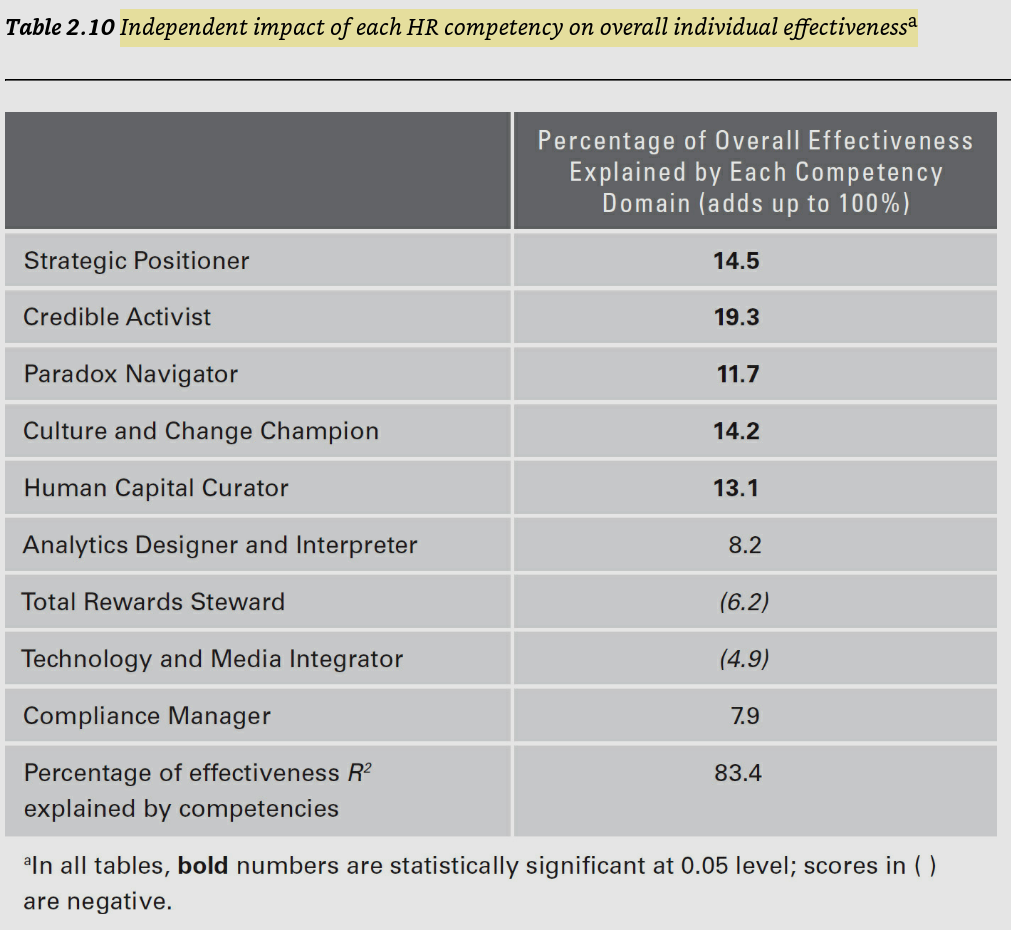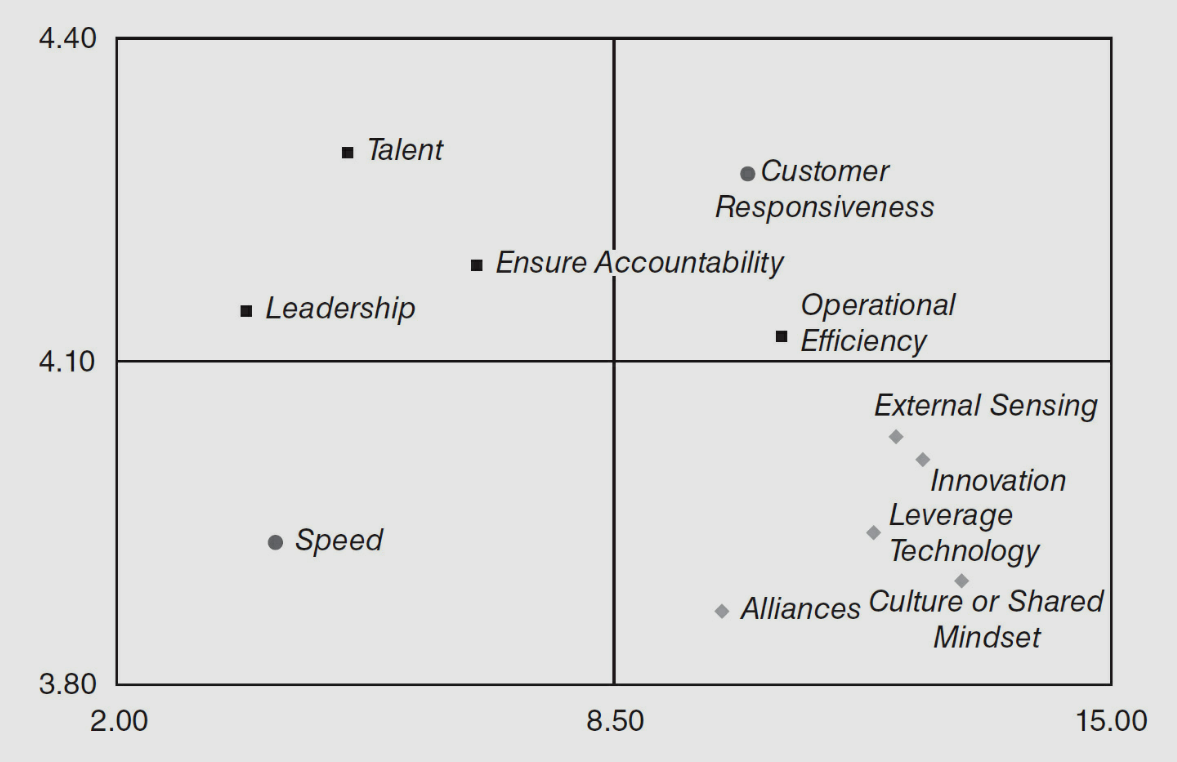Andrey Kulikov
Key Ideas from the Book "Victory through Orgnanization" by Dave Ulrich
Dave Ulrich wrote "Victory through Organization", great book for HR specialists, which explores the most important individual and team competencies of HR profession. The book is based on survey of over 4000 HR professionals and provides a lot of advice, case studies and detailed recommendations for specific competencies of HR professional, and in this article I tried to write down some ideas, which stood out for me.
- HR matters because it can support the business strategy, which anticipates or responds to external conditions
- Most difficult business chalenges are those related to execution with discipline, managing change
- HR should take care both of talent needs and of org. capabilities
- Authors propose to use STEPED (Social, Technological, Environmental, Political, Economic, Demographic) trends to analyse changing business environment
- Stakeholders for HR are internal (managers, employees) and external (customers, shareholders, community, government, partners)
- HR professionals need different competencies to deliver value to the external stakeholders
- Business strategy (incl. HR strategy) should be forward-looking, about preparing for future challenges, building competitive organisation
- HR departments should be organised to match business organisation
- HR should focus on business deliverables more than on administrative activities
- Survey collected data from 4000 HR professionals and 28000 associates with 360-degree data to assess HR competencies
- Authors share the findings about different HR competencies, their impact on overall individual effectiveness, impact on value for stakeholders

- Being a "Credible Activist" is the most important competency for HR to be personally effective
- The quality of HR department (and its activities) had much stronger impact on business perfrormance than individual HR competencies (31% vs 7.7%)
- Organisations achieve competitive advantage by leveragins specialization, optimizing information costs, and by creating and leveraging talent
- It is not enough to hire and develop talents, it's crucial to organise talents
- Organisations can be analyzed and structured through the "capabilities" - what organisation does toward creating value for stakeholders
- The capability analysis starts with the question: does your organisation meet current and future needs of marketplace better than competitors?
- Authors identified 11 basic org. capabilities and made a matrix of their effectiveness and impact

- HR should identify basic org. capabilities, technical and cultural capabilities and implement org. practices needed to build the required capabilities
- Authors share an example of org. capability audit to assess current state of organisation
- HR can contribute to business performance by building capability for information management (e.g. how socially based unstructured information is created, shared and utilized)
- HR can enable and facilitate information sharing activities (town halls, collaborative insights sessions) and encourage utilization of information through behaviour-based performance evaluations
- Integrated HR practices have strong impact on business performance
- Many companies are redesigning their performance feedback process
- High-potential individuals are interested in on-the-job assignments that are both challenging and valuable
- HR analytics can help to identify how HR creates the greatest value and to focus resources
- We can measure HR impact by connecting the required org. capability with required behaviours and checking which HR interventions are related to that behaviour
- HR can develop "Credible Activitist" competency by connecting with employees and delivering results to them
- Once the trust is obtained, Credible Activists can start challenging the org. norms and practices, ways of thinking
- Authors explore subdomains of "Credible Activist" competency, including "Influences and relates to others" and "Earns trust through result"
- Balance of Humility and Confidence is important for leaders and HR professionals
- Earning trust through results is possible by connecting to the stakeholders, starting with small effective changes, under-commiting and overdelivering
- HR professionals should master the competency of strategic positioner by knowing the flow of business, focus on competitive advantage and co-create with external stakeholders
- HR work crosses functional boundaries with marketing (branding), finance, IT
- HR professionals should know who makes key decisions in their organisations
- HR professionals should understand investor expectations and how they measure intangible values of brand, innovation and leadership
- Authors propose Leadership Capital Index which can be used to estimate individual and organisational dimensions and share that assessment with investors to establish trust
- HR professionals should inform business units' strategy on questions where do we compete and how do we win
- Competency of navigating paradoxes can be beneficial for HR and the whole company by enabling flexibility of moving from convergence (one clear decision) to divergence (alternative perspectives). E.g. effectively managing the tension between the need for change and stability. Examples of common org. paradoxes are also provided
- Changes to HR processes cannot be sustained unless they are connected to broader org. culture topics (and vice versa)
- HR professionals should incorporate culture into their actions (e.g. audit the extent to which there's a shared culture among the managers, translate promises of brand identity into internal actions)
- Compliance managers can become enablers by actively collaborating with regulators and labor pools and foster regulatory innovation
- It is important for compliance managers to find proper balance between being "policy state" and being completely passive
- To become better analytics designer and interpreter, HR professional should start with business questions, and then use analytics to discover which HR investments can bring the best business results
There's a lot to be learned for HR professionals and they can improve the value of their function by thinking "outside-in" (through the eyes of their stakeholders) and developing the most critical competencies.